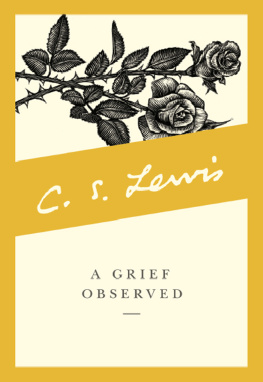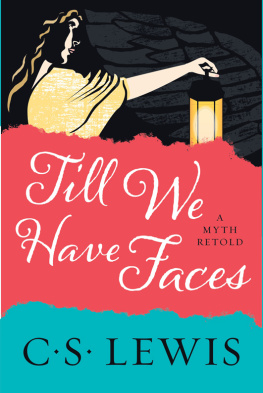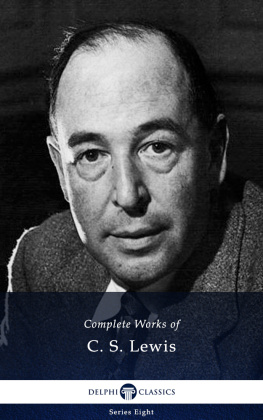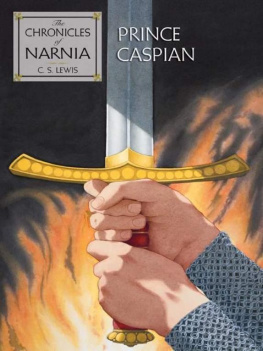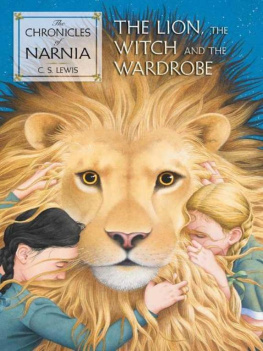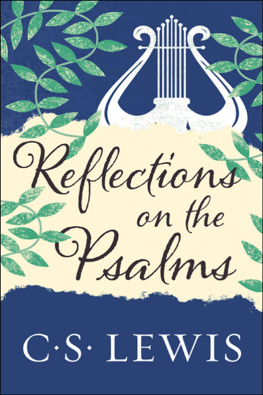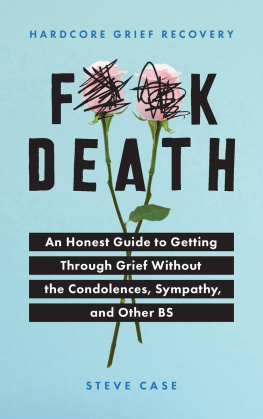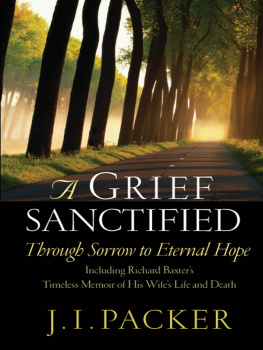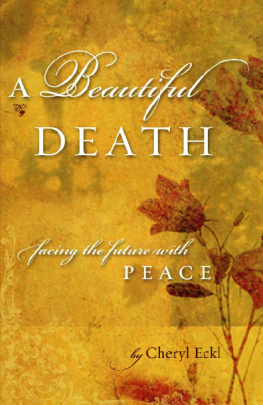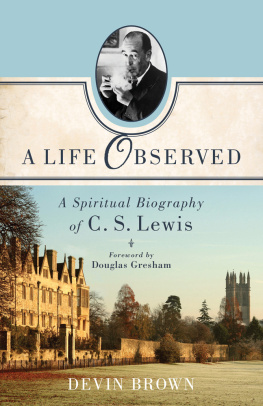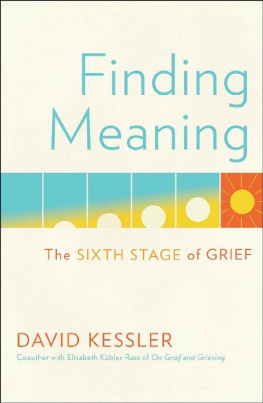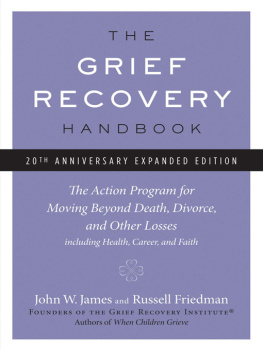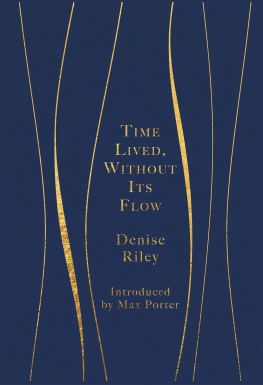C. S. Lewis
When A Grief Observed was first published under the pseudonym of N. W. Clerk it was given me by a friend, and I read it with great interest and considerable distance. I was in the middle of my own marriage, with three young children, and although I felt great sympathy for C. S. Lewis in his grief over the death of his wife, at that time it was so far from my own experience that I was not deeply moved.
Many years later, after the death of my husband, another friend sent me A Grief Observed and I read it, expecting to be far more immediately involved than I had on the first reading. Parts of the book touched me deeply, but on the whole my experience of grief and Lewiss were very different. For one thing, when C. S. Lewis married Joy Davidman, she was in the hospital. He knew that he was marrying a woman who was dying of cancer. And even though there was the unexpected remission, and some good years of reprieve, his experience of marriage was only a taste, compared to my own marriage of forty years. He had been invited to the great feast of marriage and the banquet was rudely snatched away from him before he had done more than sample the hors doeuvres.
And to Lewis that sudden deprivation brought about a brief loss of faith. Where is God?Go to him when your need is desperate, when all other help is in vain, and what do you find? A door slammed in your face.
The death of a spouse after a long and fulfilling marriage is quite a different thing. Perhaps I have never felt more closely the strength of Gods presence than I did during the months of my husbands dying and after his death. It did not wipe away the grief. The death of a beloved is an amputation. But when two people marry, each one has to accept that one of them will die before the other. When C. S. Lewis married Joy Davidman, it was a pretty certain expectation that she would die first, unless there was an unexpected accident. He moved into marriage with an imminent expectation of death, in an extraordinary witness of love and courage and personal sacrifice. Whereas a death which occurs after a full marriage and a reasonable life span is part of the whole amazing business of being born and loving and living and dying.
Reading A Grief Observed during my own grief made me understand that each experience of grief is unique. There are always certain basic similarities: Lewis mentions the strange feeling of fear, the needing to swallow, the forgetfulness. Perhaps all believing people feel, like Lewis, a horror of those who say of any tragedy, Thy will be done, as though a God of love never wills anything but good for us creatures. He shows impatience with those who try to pretend that death is unimportant for the believer, an impatience which most of us feel, no matter how strong our faith. And C. S. Lewis and I share, too, the fear of the loss of memory. No photograph can truly recall the beloveds smile. Occasionally, a glimpse of someone walking down the street, someone alive, moving, in action, will hit with a pang of genuine recollection. But our memories, precious though they are, still are like sieves, and the memories inevitably leak through.
Like Lewis, I, too, kept a journal, continuing a habit started when I was eight. It is all right to wallow in ones journal; it is a way of getting rid of self-pity and self-indulgence and self-centeredness. What we work out in our journals we dont take out on family and friends. I am grateful to Lewis for the honesty of his journal of grief, because it makes quite clear that the human being is allowed to grieve, that it is normal, it is right to grieve, and the Christian is not denied this natural response to loss. And Lewis asks questions that we all ask: where do those we love go when they die?
Lewis writes that I have always been able to pray for the dead, and I still do, with some confidence. But when I try to pray for H. [as he calls Joy Davidman in this journal], I halt. And this feeling I well understand. The beloved is so much a part of ourselves that we do not have the perspective of distance. How do we pray for what is part of own heart?
We dont have any pat answers. The church is still pre-Copernican in its attitude toward death. The medieval picture of heaven and hell hasnt been replaced with anything more realistic, or more loving. Perhaps for those who are convinced that only Christians of their own way of thinking are saved and will go to heaven, the old ideas are still adequate. But for most of us, who see a God of a much wider and greater love than that of the tribal God who only cares for his own little group, more is needed. And that more is a leap of faith, an assurance that that which has been created with love is not going to be abandoned. Love does not create and then annihilate. But where Joy Davidman is now, or where my husband is, no priest, no minister, no theologian can put into the limited terms of provable fact. Dont talk to me about the consolations of religion, Lewis writes, or I shall suspect that you do not understand.
For the true consolations of religion are not rosy and cozy, but comforting in the true meaning of that word: com-fort: with strength. Strength to go on living, and to trust that whatever Joy needs, or anyone we love who has died needs, is being taken care of by that Love which began it all. Lewis rightly rejects those who piously tell him that Joy is happy now, that she is at peace. We do not know what happens after death, but I suspect that all of us still have a great deal to learn, and that learning is not necessarily easy. Jung said that there is no coming to life without pain, and that may well be true of what happens to us after death. The important thing is that we do not know. It is not in the realm of proof. It is in the realm of love.
I am grateful, too, to Lewis for having the courage to yell, to doubt, to kick at God with angry violence. This is a part of healthy grief not often encouraged. It is helpful indeed that C. S. Lewis, who has been such a successful apologist for Christianity, should have the courage to admit doubt about what he has so superbly proclaimed. It gives us permission to admit our own doubts, our own angers and anguishes, and to know that they are part of the souls growth.
So Lewis shares his own growth and his own insights. Bereavement is not the truncation of married love but one of its regular phaseslike the honeymoon. What we want is to live our marriage well and faithfully through that phase, too. Yes, that is the calling of either husband or wife after the other has died.
I have pictures of my husband in my study, in my bedroom, now, after his death, as I had them around while he was alive, but they are icons, not idols; tiny flashes of reminders, not things in themselves, and, as Lewis says, sometimes a block rather than a help to the memory. All reality is iconoclastic, he writes. The earthly beloved, even in this life, incessantly triumphs over your mere idea of her. And you want her to; you want her with all her resistances, all her faults, all her unexpectedness. And this, not an image ormemory, is what we are to love still, after she is dead.
And that is more important than visitations from the dead, though Lewis discusses that possibility of these. In the end, what shines through the last pages of his journal of grief is an affirmation of love, his love for Joy and hers for him, and that love is in the context of Gods love.
No easy or sentimental comforts are offered, but the ultimate purpose of Gods love for all of us human creatures is love. Reading A Grief Observed is to share not only in C. S. Lewiss grief but in his understanding of love, and that is richness indeed.

